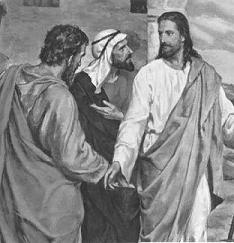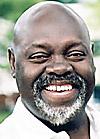 Epiphany 2 – January 15th, 2006
Epiphany 2 – January 15th, 2006
John 1:43-51
“Found, Known, Believed”
I. Introduction – This week and next, our Gospel readings find Jesus very busy calling disciples to follow him. Next week, we have the fishermen- Peter and Andrew, James and John. This week, Phillip and Nathanael. I think these accounts are not only familiar to most of us, but they are near to our hearts. We can relate to them, because Jesus calls us to follow him too. And our following is often very similar.
As we see the disciples following, as we think on our own following, and as we see the key words in this text, we see that following involves some finding, some knowing, and of course, believing. But maybe not the way we think…
II. FoundIn the first couple of verses, there’s a lot of “finding” going on. First Jesus finds Philip. Then Philip finds Nathanael. Then Philip tells him they have found, essentially, the Christ! But as enthusiastic as Philip was, as eager to go and tell and share his great news, he was wrong.
Oh, sure, Jesus was the one written about by Moses and the prophets. But did you notice he called him “Son of Jospeh”. That wasn’t really the case, was it. How could Philip know, though, that the man he was about to follow was really the Son of God?
And Philip was wrong when he said “WE have found the one…”. No, we just read that it was Jesus, who, in fact, found Philip. But it’s often that way with us modern disciples too. We make the same mistake. We think we find Christ. No, rather, he finds us.
After all, we are the ones that are lost. We are the ones that don’t know our way, because we have turned away from God in our sin and gotten hopelessly lost in a maze of corruption that is handed down from generation to generation. We are often so lost, we have no clue how lost we are.
And so it’s no small thing that Jesus found Philip. And it’s no small thing that he finds us too. He finds us in our baptism. He finds us through his word – calling us to repentance and faith – over and over again.
Finally, we will speak well of Philip on this count – when Jesus called him to follow, he did. And Philip knew that following meant bringing others along. He found Nathanael, and brought him to Jesus. And Jesus, through Philip, and again through his word, would “find” Nathanael too.
III. KnownNathanael seems to me like a bit of a know-it-all. He certainly doesn’t come off well with his condescending comments about Nazareth. But Nathanael knew that Nazareth was a backwater town. He didn’t expect anyone who knew much about anything to come from there – much less the very Messiah they had been waiting for. “Nazareth! Can anything good come from there?” he asked, and expected the answer was “no”.
But little did he know, it was, “yes!” Jesus Christ, Son of Man and Son of God comes from there. And what little Nathanael knew about Jesus seemed all the less, compared with what Jesus knew about him.
Though Nathanael had as much as insulted Jesus, or at least his home town, Jesus meets Nathanel and compliments him, “Here is a true Israelite, in whom there is nothing false.” Jesus knew something about Nathanael! What did he mean by that, “A true Israelite in whom there is nothing false”? Well he didn’t mean Nathanel was without sin. He didn’t mean Nathanael didn’t’ need a Savior. Likely Jesus was commending Nathanael’s proper Old Testament faith in the Christ who was to come. Nathanael knew his scriptures. He knew what Moses and the prophets had written about the “one who is to come”, that is, the Messiah. And now, to his great surprise, he was meeting him.
Nathanael is surprised that Jesus knows him, and Jesus shocks him all the more by mentioning the fig tree. Here Jesus demonstrates a knowledge that no mere mortal could have had. He saw Nathanael, he knew Nathanael before he could have seen him. And he knew Nathanael better than the disciple knew himself. Nathanael had much to learn.
Isn’t it this way with us, too? We are often know-it-alls. We think we know our needs, we think we know what God wants from us. Even some Christians seem to think they learned it all years ago, and have nothing to gain from continued study of God’s word. As if 8th grade confirmation is the end of our faith learning.
Or maybe some who read the bible, study it, attend various classes, perhaps become prideful of our biblical knowledge, as if knowing enough will somehow save us. It won’t.
It’s so easy to sin. It’s our nature. But Jesus knows our weakness. For Jesus knows us better than we know ourselves. He knows our needs better than we do. He alone knows how to do the saving. And he does it. And it’s not by seeking him that we are saved. And it’s not by knowing-it-all, or even knowing enough, it’s believing.
IV. BelievedNathanael states his faith – his trust – his belief in Jesus. Jesus is more concerned about peoples’ faith than their knowledge anyway. So often he comments on someone’s great faith. So too with Nathanael. He doesn’t say “you’ve found me” or “you know me”. He says, “You believe me”.
Nathanael’s great confession here, is right up there in the top ten, along with Peter’s great confession, “You are the Christ, the Son of the Living God!” and Thomas’ “My Lord, and my God!”. But Nathanael’s statement of faith was given right out of the gate. Peter’s great confession wasn’t until Jesus was well into his public ministry. Thomas’ was after the Resurrection. So for Nathanael to express such profound trust, and to make such a confession even as he was being called as a disciple – is truly remarkable. It is another hint that the faith he speaks comes as a gift – from the one his faith is in.
So too, when we confess with our lips and believe in our heart that Jesus Christ is Lord – we do not speak on our own. We speak by the power of His Spirit given in our baptism. We speak the words he gives us. We say what he has already said to us, and for us. And we say it, like Nathanael, in faith.
Jesus then goes on to say, in effect, “You aint seen nothin’ yet!” Nathanael would see “Heaven opened, and angels ascending and descending on the Son of Man”. What a strange thing for Jesus to say… But Nathanael likely knew what Jesus meant.
In the Old Testament, which Nathanael knew well enough, there is the story of Jacob, the patriarch. One night while sleeping with his head on a rock, Jacob had a vision of a ladder to heaven, and angels going up and down. He names the place Bethel, meaning, house of God.
What Jesus is saying is, “Nathanael – I AM JACOB’S LADDER” and, “I AM the way to heaven”. And in the next few years, Nathanael and all Jesus’ followers, would see heaven opened to them – and to the world – in Jesus. And we see it too…
Perhaps we see it most clearly at the cross. Nathanael called Jesus, “Son of God and King of Israel”, but at the cross, we see him called “King of the Jews” in a sarcastic Roman fashion. There at the cross, heaven was opened - so that God’s wrath could be poured out on his only Son. And as Jesus bears our sin, and suffers in our place, Heaven is open to us. When, “it if finished”, that cross becomes our ladder to an open heaven. The sign of execution and shame and death becomes a symbol of hope, and comfort, and life.
In this Nathanael believed. This we believe, this we teach and confess. Jesus Christ crucified. He who finds sinners like us. He who knows our deepest needs. And he who opens heaven to us by his death and resurrection, and through the faith which his Spirit creates in us.
Found by Christ, Known by Christ, Believing in Christ, “The Son of God, and King of Israel”. In His name, Amen.
V. Conclusion
Jesus finds Philip, knows Nathanael, and they believe in Him. Let us also believe in the one who finds and knows us – and who opens heaven for us, Jesus Christ, our Lord!






